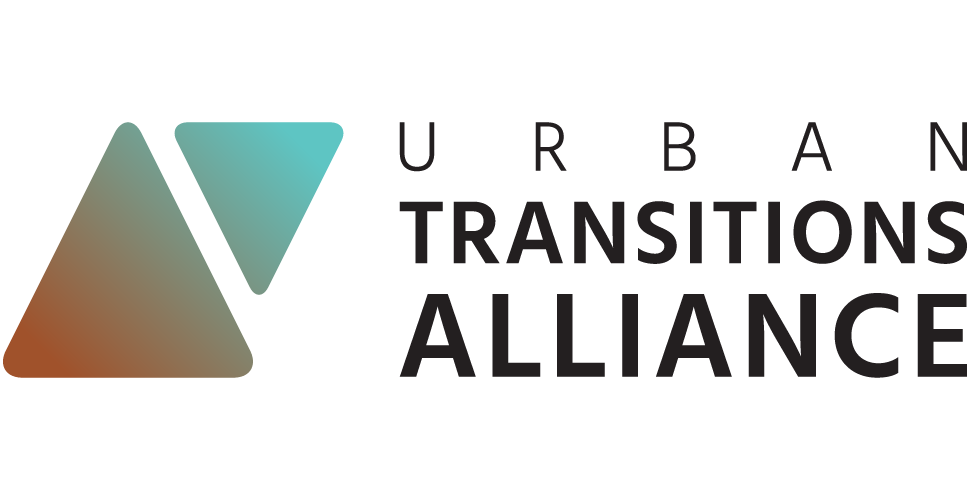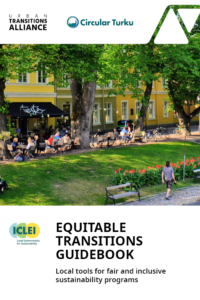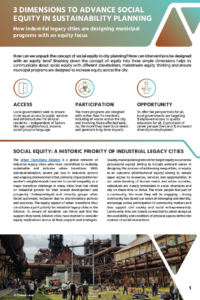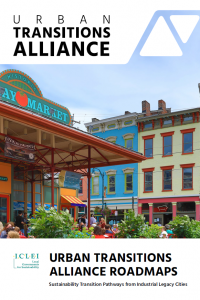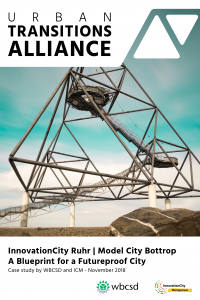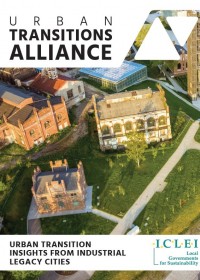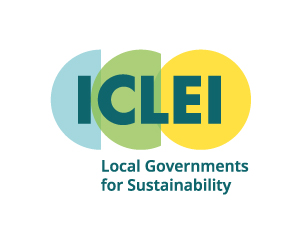RESOURCES
The Alliance cities jointly focus on key transition challenges.
Sharing ideas and experiences, knowledge gaps are filled to co-create solutions
that enhance equitable and sustainable urban development.
Infrastructure Transition
Industrial legacy cities are re-designing and adapting their infrastructure systems to meet current needs and challenges. In order to re-vitalize legacy neighborhoods, they re-purpose or replace disused factories and derelict railway tracks. In addition, their infrastructure systems need to be future-proofed in light of a changing climate. Alliance cities work together to identify good practice examples of urban regeneration and climate change adaptation.
Infrastructure Transition
Social Transition
Deindustrialization has resulted in substantial job losses in legacy sectors such as mining and manufacturing, leaving industrial legacy cities and their communities with a need to rebuild their economies and redefine their identities – while ensuring that no one is left behind in the transition. Alliance cities explore shared pathways to strengthen their communities and create equal opportunities, e.g. through innovative citizen engagement and career education initiatives.
Social Transition
Energy Transition
Historically, industrial legacy cities have spurred the extraction of fossil fuels either as important mining sites or sites of heavy industry. However, the transition from an economy based on fossil fuels to a renewable energy system is crucial to achieve ambitious climate goals and provide new economic opportunities. The Urban Transitions Alliance cities are jointly exploring challenges and opportunities associated with decarbonizing their energy systems.
Energy Transition
Mobility Transition
The path dependence of existing infrastructure has ‘locked-in’ many industrial legacy cities into a car-based transport system rendering the transition to sustainable and equitable urban mobility particularly challenging. Identified as a priority area, Alliance cities exchange thoughts, ideas and experiences on how to ‘green’ their urban mobility by leveraging legacy infrastructure assets, increasing public support and incentivizing active lifestyles across their communities.
Mobility Transition
ALLIANCE WEBINAR SERIES
Watch the Alliance webinars and learn about the Alliance cities’ expertise, experiences and good practices.
Prioritizing Equity in Local Climate Action
08 October 2020
Social Transition
Inclusive and citizen-led climate change adaptation
23 July 2020
Infrastructure Transition
Strategies for renewable energy expansion in China
15 March 2018
Energy Transition
Accelerating the mobility shift in industrial legacy cities
18 May 2018
Mobility Transition
PUBLICATIONS
Read up on transition insights and Alliance case studies from industrial legacy cities.
Equitable transitions guidebook: Local tools for fair and inclusive sustainability programs
Structured along the three dimensions of the Urban Transitions Alliance equity framework, the guidebook provides just transition insights and recommendations for city practitioners. It compiles best practices, resources and tools to better understand and unpack what social equity means for sustainability programs at the local level.
Published on 30 June 2022
Urban Transitions Alliance equity framework: How industrial legacy cities are advancing climate justice locally
How can ambitious climate targets be aligned with social equity considerations to ensure no local residents or communities are left behind in the transition? Breaking down the concept into the three dimensions of ACCESS, PARTICIPATION and OPPORTUNITY, the Urban Transitions Alliance equity framework provides a hands-on approach for cities to locally accelerate climate justice and social equity.
Published on 29 October 2021
Urban Transitions Alliance Roadmaps:
Sustainability Transition Pathways from Industrial Legacy Cities
The Urban Transitions Alliance was built on the premise that by connecting industrial legacy cities from the US, Europe and China through their transition stories and visions of sustainable urban development, common challenges and transition pathways would emerge. The Alliance was designed to provide the infrastructure and support to advance collaboration between the cities. This report details four transition pathways that the cities have undertaken, with implementation ideas and best practices for each.
Published on 22 April 2019
InnovationCity Ruhr | Model City Bottrop: A Blueprint for a Future-Proof City
Bottrop, a midsize city in Western Germany, is a typical city of the Ruhr region. It is strongly influenced by coal mining and heavy industries. Its industrial character is, however, a thing of the past: Bottrop’s last coal mine will shut down at the end of 2018. Bottrop started in 2010 to get ready for the challenges of climate change. The corresponding change in energy supply, from coal to renewables, has turned out to be a good opportunity to futureproof the city. A lot can be learnt from Bottrop’s efforts to transform from an industrial center into a climate-resilient and sustainable city.
Published on 27 November 2018
Urban Transition Insights from Industrial Legacy Cities
The Urban Transitions Alliance has grown into a strong network and knowledge-exchange hub of innovative urban transitions policies and projects. It supports industrial legacy cities from China, Europe and the US to identify common challenges, share knowledge and develop solutions according to their most pressing needs and interests. The knowledge captured from the initial Alliance exchanges in the fields of infrastructure, social, energy and mobility transition has been summarized in these transition briefing sheets.
